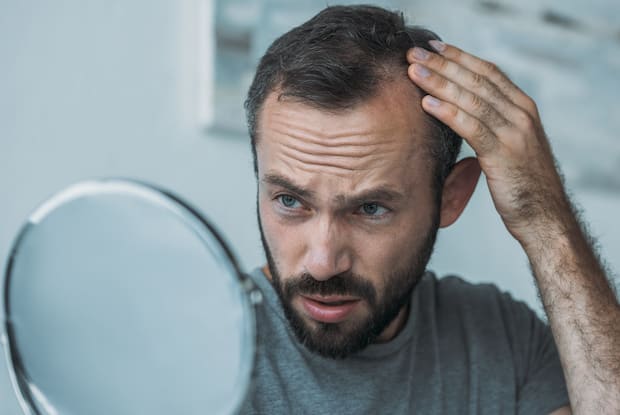Male pattern baldness, or androgenetic alopecia, affects up to 80 percent of men by the age of 80. 1 There are several types of hair loss, but androgenetic alopecia is the most common. Hair loss can reduce a man’s self-esteem and confidence and may cause stress and social anxiety. Luckily, mailMymeds carries several prescription treatments that can slow the progression of hair loss. Commonly prescribed hair loss medications include finasteride, minoxidil, and spironolactone. Read on to learn about the efficacy and side effects of these drugs so you can make an informed decision about your hair loss treatment.

What is Finasteride Used For?
Finasteride is approved to treat hair loss in men only. This medication can also be used to treat the symptoms of benign prostatic hyperplasia (BPH). Finasteride belongs to a drug class called 5-alpha reductase inhibitors. The 5-alpha reductase enzyme converts the body’s testosterone into androgen, and a high level of androgen is associated with hair loss. By inhibiting 5-alpha reductase and preventing testosterone from becoming androgen, finasteride can increase the number of hairs on the scalp.
Finasteride Side Effects
Finasteride may not be suitable for you if you have ever had prostate cancer or liver disease. As mentioned above, finasteride should not be taken by a woman or a child. If a woman is exposed to finasteride during pregnancy, the baby may be harmed. It is essential to avoid exposing your skin to the medication because this medicine can be absorbed through the skin.
Common side effects of finasteride include decreased sex drive, erectile dysfunction, and abnormal ejaculation. Despite these side effects, finasteride is proven to prevent hair loss and promote hair growth in most men with male pattern baldness. 2 It is important to discuss the benefits and risks of finasteride before starting treatment.

What is Minoxidil?
Minoxidil is another popular hair loss treatment for men. It is a vasodilator that may also be used to treat high blood pressure (hypertension). This medication comes in various forms, but the topical minoxidil solution is the most commonly prescribed form for hair regrowth.
Minoxidil stimulates hair growth by prolonging the active growth phase (anagen) and increasing the hair follicles’ size. Minoxidil is also thought to open the potassium channels in the body, which benefits hair follicles. 3 For adults using minoxidil, the usual recommended dosing is a twice-daily application to the scalp. For children, the dosing is usually determined by the doctor on a case-by-case basis.
Minoxidil Side Effects

Topical minoxidil may cause changes to the color and texture of your hair. Although severe side effects are rare, minoxidil is known to cause severe scalp irritation, chest pain, rapid weight gain, and dizziness in some men. These side effects are more likely to occur if administered in tablet form. If you experience any severe side effects, contact your doctor as soon as you can.
Spironolactone for Hair Loss
In addition to promoting hair growth, spironolactone is approved for several health conditions, including hypertension, heart failure, liver disease, and kidney disease. Spironolactone promotes hair growth by slowing the production of androgens. Because androgen levels are naturally higher in men, spironolactone may be more effective at treating hair loss in women. However, every case of hair loss is different, and your doctor may determine that spironolactone is the best course of treatment for you.

Side Effects of Spironolactone
In rare cases, spironolactone may cause severe side effects like gastrointestinal bleeding. More common side effects may include:
- Headache
- Dizziness
- Drowsiness
- Weight gain
- Depression
- Fatigue
- Low sex drive
- Diarrhea
Spironolactone is also associated with high levels of blood potassium, which could potentially be life-threatening. High potassium in the blood may cause nausea, an abnormal heartbeat, and paralysis. Generally, these side effects are uncommon, and the benefits of spironolactone for hair growth may be worth the risk.
Ultimately, any medical hair loss treatment comes with the risk of side effects, and you will have to decide whether the benefits outweigh the risks. In many cases, hair loss is indicative of an underlying disease or condition that requires attention. Once the root cause of hair loss is treated, your hair may grow back.
To learn more about the various types of hair loss in men and women, visit our blog and read our hair loss articles. MailMymeds offers all the medications mentioned here at significant discounts. Sign up for an online telemedicine appointment to assess your hair loss condition today.
The content in this article is intended for informational purposes only. This website does not provide medical advice. In all circumstances, you should always seek the advice of your physician and/or other qualified health professionals(s) for drug, medical condition, or treatment advice. The content provided on this website is not a substitute for professional medical advice, diagnosis, or treatment.






